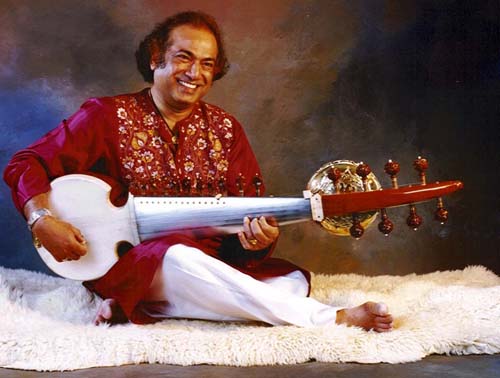
Mr. Hyphen talks to one of the world's greatest Sarode players, Aashish Khan.
CalArts is an amazing place. It is one of the few arts schools in the country where so many different disciplines (dance, animation, music, visual arts, theater, and film) converge under one roof. In fact, it is the only school where such artistic diversity exists within one building. It is no surprise then that the school has attracted and nurtured so many master level artists from around the world to teach and inspire students here. Ravi Shankar was the first north Indian musician to teach here over 30 years ago. Even today, master world musicians Swapan Chaudhuri (tabla), Wenton Nyoman (Indonesian Gamelan), Alfred & Kobla Ladzekpo (African percussion), and Miroslav Tadic (Flamenco Guitar) teach in the school's World Music department.
Among those masters is Aashish Khan, who recently joined the school's faculty. There is a whimsical and fluid creative energy that radiates from his presence. That open creative energy is reflected in all the different instruments that his students are playing today in the North Indian Ensemble at CalArts. Harps, flutes, electric guitars, Erzhus, sitars, saxophones, djimbes, pandieros and laptops running MAX/MSP are all eager to come to life with Aashishji’s interpretations of ragas. Each week, musicians of all cultural backgrounds converge to apply musical concepts rooted in north Indian music to their own instruments. The result is something to behold. An orchestra of different instruments around the world vibrating the depth and beauty of north Indian melodies and rhythms. It is an openness that is a hallmark of his family’s musical lineage.
Aashishji is the eldest son of Maestro Ali Akbar Khan, one of the greatest sarode musicians alive today. Ali Akbar Khan opened the Ali Akbar College of Music in San Rafael, California in the sixties, enabling thousands of students to study north Indian music in pure way. Aashishji is among a handful of living north Indian instrumentalists who have studied with not only his illustrious father and his legendary aunt Annapurna Devi, but his grandfather, the great Baba Allaudin Khan (1862-1972) of Maihar, India.
Baba, a mystical musical genius, is credited by many as being a singular force in shaping what we now call north Indian classical music. He innovated instrument design on the sarode, sitar and many more. He studied western and eastern musical concepts, and is said to have been able to play over 100 musical instruments. Ali Akbar Khan, Ravi Shankar, Nikhil Banerjee, Annapurna Devi, SD Burman, Pannalal Ghosh, and Timir Baran were among the many incredible disciples who studied with him to become the great musicians they are.
Aashishji studied with the great Master for over 25 years.
A world class Sarode player and composer, Aashishji’s musical accomplishments are astounding. He was just recently a finalist for a Grammy in the World Music Category for an album. He worked closely with George Harrison on “Wonder Wall.” He performed sarode on Richard Attenborough’s Gandhi. He was awarded the Sangeet Natak Award by the President of India, one of the Highest Awards for the Classical Music of India.
Most recently, Aashishji even performed as part of an animation that I scored here at CalArts. Check out his exquisite playing on Joel Crawford's animated short.
Now, he is teaching full-time at the California Institute of the Arts. I sat with him to hear the incredible stories of his training with Baba and how that training has shaped who he is today…
Tell me about your training, as a young person…what was it like for you, learning to play Sarode in Maihar, India?
I was very young when I was given a baby sarode. Probably 5 or 6 years old. I was not even aware…This baby sarode was given to me by my grandfather, and he started teaching me…he would draw lines on the sarode plate so I could put my finger in the right spot. At first it wasn’t that many hours…but gradually it became 12 hours a day, 4 hours in the morning, 4 hours in the afternoon, and 4 hours in the evening. Plus, he would teach me whenever he would feel like…sometimes in the morning, sometimes in afternoon, during the night. I used to practice in his bedroom, plus there is a big sitting room, living room, so he could hear me and correct me. So I was always under his constant guidance, I was protected. I give the same treatment to my students, I catch them whenever they make mistakes. So I am very critical in the beginning. It might be frustrating for them and as well for me, but gradually they develop the right habits themselves. The initial stages are very critical for any student of this music, to prevent the development of wrong habits, because if you don’t correct
them, they remain throughout the rest of their lives.
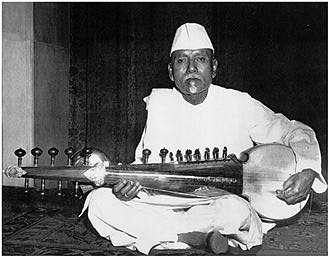
Baba Allaudin Khan in Delhi, after he accepted the Padma Vibhushan awarded to him by the President of India.
When you were studying as a young boy, with your grandfather, what would you practice? Would it be one simple thing to work on?
First it was only simple exercises. No raag, or raaginis…no compositions. Just exercises, to develop right and left hand. First it was alaankars and bols, and then there was a stage when he started to show me meend (bending)…because meend can only be practiced when the ear is fully developed. But before that, you have to only develop your right hand, left hand, so that you play correct notes, and all shuddha (natural) swaras (notes), no komal (sharp) swaras, nothing. That went for a few years. Then he started giving me gats, compositions, that were very much fixed. And that also was only in Raag Bilawal in the daytime. In the evening it was Yeman Kalyan. So that went on for a few years. He never changed the raags, never gave new materials. Unless I perfect the exercises to his satisfaction, he would never give me a new lesson. If couldn’t play the old lesson, how could I pick up a new one?
So once I perfected that, after some time, after I became more matured, then he started pouring things. My God, I was so overwhelmed by that, it was too much for me to digest. Because I was so
young.
Baba in his bedroom and study in Maihar, India.
How old were you when it became really serious?
I was eleven, twelve. Sometime I used to hate it, because it was so rich, so complex, and so difficult…to be able to differentiate between three ragas…like Puriya, Sohini, and Marwa…same thing with Hamir, Kamod, and Chayanat…they were very much related, they are borderline ragas. Those types of ragas were very difficult for me to absorb, to memorize, and to be able to digest. So, that is how my taalim went, on and on for years.
Then at twelve or thirteen, I played with him in New Delhi on All India Radio, a national radio program, in a live broadcast. Tabla was played by late Pandit Kanthe Maharaj, the Guru and Father of Kishan Maharaj. That was a great experience for me.
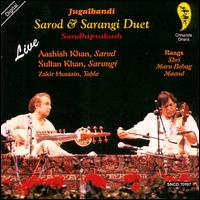
Aashish Khan & Sultan Khan
Was it difficult, scary for you?
It was the first time I played publicly. There was a very selected audience in front of us. It was an air conditioned small hall, auditorium. Live broadcast. Of course, before that I played in Maihar, when visitors would come. And they would like to listen to my grandfather. So he used to always make me play with him…but this was something else. In Kolkata, we had three generations playing together: my grandfather, my father, and myself. At the Tansen music conference, at Indira Cinema Hall. That was overpacked, literally people were standing, there was no room for sitting. It was a small movie theater, in those days it was considered the largest hall. Largest capacity. And people sitting on the street, and all the traffic was jammed, it was early morning, and the tram bus could not pass through those people, because they were sitting. They used to put large speakers outside, and people used to put newspaper, cover themselves with blankets, it used to be winter, month of December, and programs used to last until 9, 10 in the morning. All the traffic was jammed, nobody can pass the masses of people, because they would cause riots. Also, the tram drivers, the bus drivers, they were also music lovers, they would also join the crowd, and they would enjoy the music too.
It was a different era, it was a different audience. Everybody would understand the music, you could not fool them.
Nowadays, you can fool the audience. It is so gimmicky, anything you do funny or with a gimmick, they will like that more than the music. That is the most sad thing I see in the audiences of today, except in some places. Of course, we have a very trained audience in the western world, some good audiences in some places in India, but really, very few people understand when you are really playing good music: are you really keeping the purity of the raga, the taal?
Nowadays, many musicians are running after establishing their name. If a certain musician becomes a star, the audience thinks he is the only one, there is no one else. That used to never happen in our time. Every musician was treated equally, they were respected, and they had the same demand as anyone else except for a few that were number 1, then number 2 and number 3, but mostly all were number 1…there was high competition, there was no gimmick, just pure music. No glamorous costumes, no eye blinding costumes, big decorations on stage, nothing, just simple stages and simple presentations of gorgeous music. We did not even have good sound.
Now we have such hi fi stereophonic surround sound, but the music is not that good…we used to only have old fashioned old speakers, like the old gramophone speakers, where you could barely hear bass notes coming out of it. Nowadays, all that gimmicky sound that musicians produce from their instruments and tabla, instead of playing the right bols, right compositions, real music... they are into all this flashy sound effects, not the real music, the real tabla.
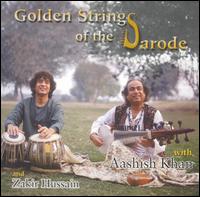
Zakir Hussain & Aashish Khan
And those days, my God, I saw I saw and was lucky to play with all the top masters, starting from Shamta Prasadji, Pandit Kanthe Maharaj, Ustad Ahmedjan Thirakwa, Shamta Prasad, Anokelalji, Kanai Dutt, Hirendra Kumar Ganguly, Mahapurush Misra, Chaturlal, Swapan Chaudhuri, Janan Prakash Ghosh…all the legends…I was fortunate that I could play with them. Today, with tabla we have such a good sound, but when they played, poor guys, they never even used to say or know if people can hear them or not. Only the audience used to sometimes ask, “Can you please turn up the tabla a little more?” Politely.
Now, it becomes like a riot, and the tabla has to dominate. The musicians, we have become secondary. There was a time when tabla was not respected. My grandfather is the one who brought them the same platform, gave them equal opportunity, to play, to do sawaal jawab (question and answer), keep playing in different taals, and then my father and Pandit Ravi Shankar, they took tabla to an even higher level. They brought in young tabla players, who were not even known, so they began getting opportunities all over the world.
Now the tabla has the highest level in the music scene. Istrumentalists are getting less and less attention, the vocalists are getting less and less. Even the young vocalists, they think they are something, but the vocalists I have heard, like Siddheshwari Devi, Ustad Bade Gulam Ali Khan, Lakshmi Shankar, Ustad Amir Khansahib, Pandit Bhimsen Joshi, Pandit Om Karnath Thakur, Bahare Buwa, Begum Akhtar, Rasoolangbhai, Girja Devi…Girja Devi and Lakshmi Shankar are the only ones alive from that time and generation.
But now, the vocal as well as instrumentalists, it is so light. If I have to listen to any instrumentalists, I listen to my father, my grandfather, and if I have to listen to vocal, I listen to Ustad Amir Khansahib, Pandit Om Karnath Tahakur, Parveen Sultana, and Ajoy Chakraborty. As my grandfather used to say, “First you should be able cry from your own music, then only can you make others cry.” If he could say something like that, then where are today’s musicians? Nowhere, we are not even born.
The music scene, from that era to this era, it has become very poor. Nowadays, we have all these recording facilities. I wish we had all these facilities in those days, then we could have recorded good music, real music. Nowadays, we have great equipment, and very little good music. It was like a mythological time, it was only 50 or 60 years ago. It wasn’t that long ago.
Tell me more about Baba Allaudin Khan, what was he like when you were a boy. Was he strict, simple?
He was an extremely simple man. He had no demands, no luxury. Just simple food, his food habits were very simple. His passion was only music, because he learned it in such a hard way. So when my father was born, he was overwhelmed by that. He wanted to give everything to him. It was like wanting to give property, but you cannot do that in music, because you have to learn it, to get the property. He was very strict with my father…and then when I was born, it was even more overwhelming for him. He said, “Not only do I have son, now I have a grandson!” He wanted to pour all his knowledge into me, and into his disciples. He would teach something one time, you should be able to understand. Second time, fine…third time, he will start getting irritated. Fourth time, he would kick you on your head or hit you with whatever is in his hand. He would lose patience. He has to keep repeating the same line, and he wants to go to the next line. Now I understand after becoming a teacher, and I feel the same thing, and now I can understand what he used to go through.
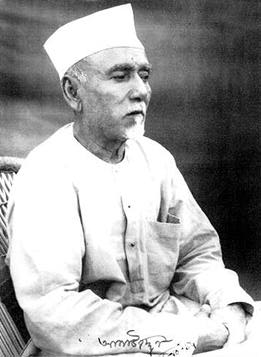
Baba Allaudin Khan
He was very strict as a person, as a teacher. As a person, so I used to be very scared of him. I never used to go in front of him. I never had a relationship with him, like a grandfather to a grandson. I was always hiding from him, whenever possible, except when I had to learn from him, I had to face him. During lunchtime or breakfast time, is the only time I would have to be in front of him. The rest of the time I was used to be in my room practicing, or doing my homework…I had a private tutor, I was never sent to a school. There was no school where I lived. When they started having school, my grandfather wouldn’t send me, because I might get spoiled being with other kids and my practice might suffer.
So your relationship, was really that of Guru and student. It wasn’t, “Let’s go have ice cream and have some fun!”
No way, forget it. Though he would love to bring me sweets. On occasion he would bring clothes, and always see that I am had enough of everything. I was always overfed. We had a cow at home, and we got fresh milk. I was definitely overfed! I put on so much weight. People used to say, “My God, his grandfather and grandmother are turning him into a pig.” They used to make that kind of comment.
How did he aquire such immense musical knowledge? Was he a genius beyond words? Were you just unable to understand how he could have this much knowledge?
When he ran away from home, he went to many different gurus. The gurus would say, “I have run out of my knowledge to give you, go find somebody else” Like that, he collected all of his knowledge from many great teachers including Nulu Ghopal, from whom he learned Dhrupad style of singing. Finally, he found his real Guru, Mohammad Wazir Khan. Wazir Khan never accepted him right away. He made him wait for 5 years, just to test his patience. He only used to serve him, he would wash his hands, he would give him water, and things like that. After 5 years, he said, “You have passed your test, now I am going to tie a Ganda [sacred thread] in a thread ceremony, and now I am going to start teaching you.” My grandfather said that was some ceremony. With big plates, silver and gold coins, food, this and that…something that you can only see in a movie. It was that kind of occasion. Calling important people, and feeding them.

Stamp of Baba Allaudin Khan issued in India
Was he one of the only disciples of Wazir Khan?
No, Amjad Ali Khan’s father, Hafez Ali Khan became his disciple. I don’t know exactly when. They were learning at the same time.
So they were around each other?
Yes, they were Gurubhais. Hafez Ali Khansahib, he used to respect him like his own big brother. There are pictures of them in a crowd of some occasion for established musicians, and you can see only these two together outside of the crowd.
They respected one another?
Very much. For 40 years, my grandfather learned from his Guru, Wazir Khan. When he finished his learning, Wazir Khan said, “Now it is time for you to go out, now you can start siksha, diksha, pariksha. You can start teaching, performing and start administering tests to determine how good other students are. You can expand your knowledge. So, my grandfather left his Guru, and came to Kolkata. He was sitting between all these big musicians. In those days, big musicians used to dress like Maharajas. Big turbans, golden Jharidhars, gold medals all over their chests…he was sitting in between all of these Ustads [showmen], with a simple cotton dhoti and kurta, and he used to wear a simple cap always. So this person, a minister of Maihar, came to find a guru for his Maharaja. He was also a Bengali. So he was surprised to see this ordinary looking person sitting amongst these maharaja looking Ustads. He got more curious, more interested in him than in the others. Then my grandfather played music.
When he played, he got very impressed and he went to him, and asked if he would like to come to Maihar. My grandfather was looking for work, a job, so he went with him, and there in the hall, a huge hall of the Maharaja, he could see only brass instruments.
In those days, the British were in supreme power. So, what musical instruments were available were brass instruments. Trombones, trumpets, kettle drums, you name it. He didn’t see any Indian instruments. Where are Indian instruments, sitar, sarode, tabla, dholak, pakawaj…the maharaja said, what are those? He didn’t even know what they were.
That same evening, the Maihar Maharaja organized a performance featuring my grandfather, and when he started playing sarode, the maharaja immediately went and grabbed his feet and said you are going to be my Guru, and said, “I am not going to let you go from here, I am going to give you a house and salary.” My grandfather was looking for a job. He wanted to take care of my grandmother and my father who was already born.
Your father, Ali Akbar Khansahib was already born…
Yes, he was hardly 3 or 4. My aunt was not born, Annapurna Devi. She was born in Maihar probably. Anyway, then after getting the job, he went to East Bengal, he settled down in Maihar.
So, this man, the Maharaja of Maihar, became his disciple but also his patron?
He respected Baba like anything. That man gave him a place to live. After than, my grandfather became famous. So many maharajas offered him more money, more place to live, including Rabindranath Tagore who offered my grandfather to come live in Shantiniketan. But he refused everybody, because of his loyalty to the Maharaja. That man took care of him all the way. My grandfather taught him vocal classical music for many many, years, towards the end the Maharaja even wanted to study Surbahar. But he was too old then.
The Maharaja just loved the music, he didn’t want to perform?
Yes. There was once a major plague epidemic. A lot of kids became orphans. So the Maihar Maharaja [king] told my grandfather, “Please take care of these kids, they are orphans, and their parents have died.” So he took care of them. My grandmother became their mother, they became musicians, and then they became known as the Maihar Band. "Band" was a popular word in those days, because of the British. It was a symphony of different instruments, a concept that never really existed in Indian music before the British arrived.
Did any of the orphans go on to become musicians?
Yes. They only knew what they were taught. There was no notation, because everything was memorized. They were serious. They dedicated their lives to music. They didn’t know anything else. They were paid by the state government. Now it is in a disasterous condition, because the Madhya Pradesh government has taken over. After independence, all the Maharajas lost their kingdoms. That [the demise of the courts] is where the disasters started in our country, because at least they were art lovers and they respected the music, and the musicians didn’t have to worry. All the good things in our classical music, they helped to create.
Today’s ministers, MPs, they are destroying the culture, music, everything. It is in a wretched condition…the Maihar Band, if you see it today, you will be in tears. What my grandfather created, where it has ended up today, it is tragic.
What is the music like today in India?
The music financiers don’t care about the quality of music, they only care about how to fill their pockets with money. They don’t care for the public, the don’t care for the country’s heritage, and they don’t want to educate the youth of India about its classical traditions. Especially in Kolkata, Bengal. Kolkata used to be the richest place for music, poetry, art, culture, cinema, theater…everything. All the great poets, writers, came from Bengal. Nowadays, among the young kids, it is a fad to have a rock band. They will just pick up a guitar, pick up a drum, they will strart singing, writing lyrics without any formal training. And they are getting paid much more than classical musicians, who have been training for their entire lives.
So, things are turning into gimmicks. A lot of classical musicians have gone into that. By creating a band, or having some kind of 50 musicians of drummers, adding dancing, whatever will attract people. That is how they are promoting Indian music, in a very deformed way. Even there are top musicians, who are doing the same thing in America, instead of promoting classical music, they are promoting something else. They want to be in limelight, they want to be called the heroes, or pop stars…I don’t call them classical musicians, because they are not promoting the classical modality. Though they have the position, which luckily they have it, they should really promote and create good listeners, taste for real classical music, which our Gurus and great masters have given their life to learn. Today, some of the top musicians, young/old, any age, are destroying it.
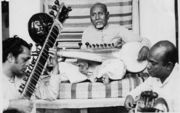
Baba Allaudin Khan with his disciples, Maestro Ali Akbar Khan (right) & Pandit Ravi Shankar
What do you think is going to happen with the young generation? Tell me what is happening with fusion music, and you create some great beautiful music with Shanti, the legendary first fusion concept in the west…what is happening now?
What is happening today, with the young generation, is that they are trying to blend these two music forms, but they are not having extensive knowledge of either their music or the western music. You have to have proper knowledge of these forms, and how to blend, and where they meet. Indian music is very strong in melody and rhythm, whereas western music is strong in harmony and also rhythms. So you have to know where we can meet very nicely, without destroying one another. Keeping equal respect for one another is critical.
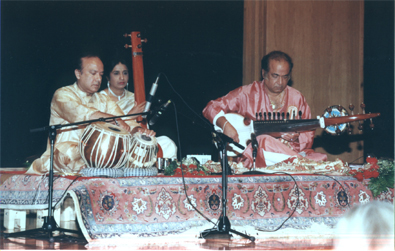
Aashish Khan and Pranesh Khan (tabla)
You are in an interesting position, now that you are teaching at CalArts. What is is like teaching and learning in America?
I am trying my best to give the pure form of our music. For the first time I am teaching at CalArts. I find very bright and intelligent students. This four five months I have taught them, some students didn’t have knowledge of the difference between Sa and high Sa. My teaching methods, and their hard work, I think it is working very well. Now they are ready for the next term. At least I find in the western world, the listeners are well educated. They know their own music. You cannot fool them. In the west I enjoy playing, because I find great audience…my father and Pandit Ravi Shankar, they have educated them with such good music, and I don’t know how long that will last with all the gimmicky music going on.
Robin Sukhadia
Mr. Hyphen 2006/2007









Comments